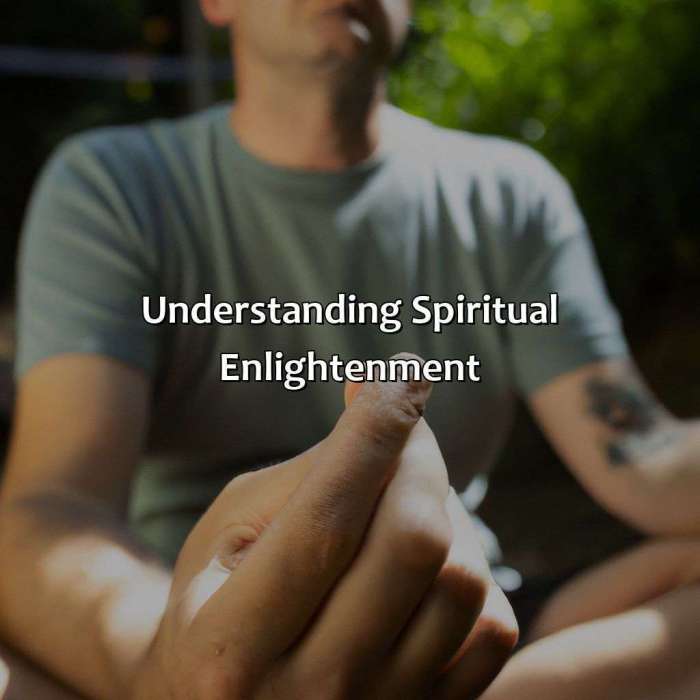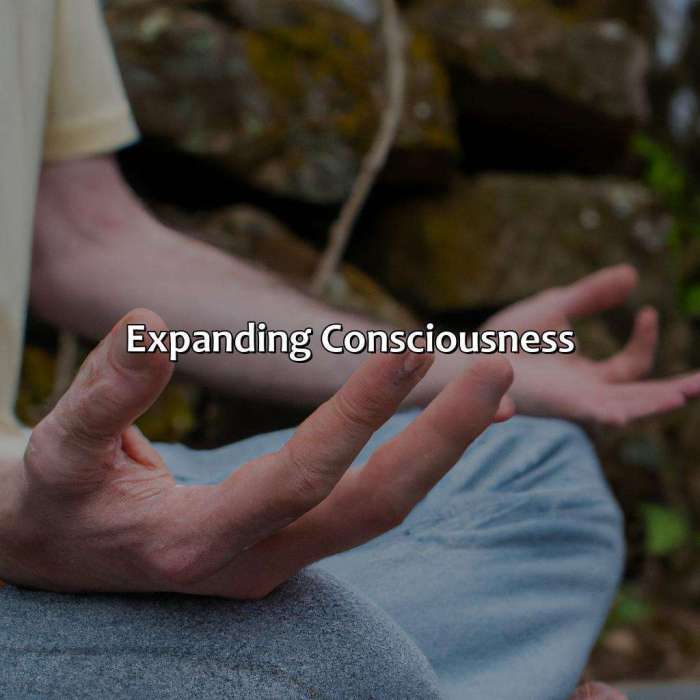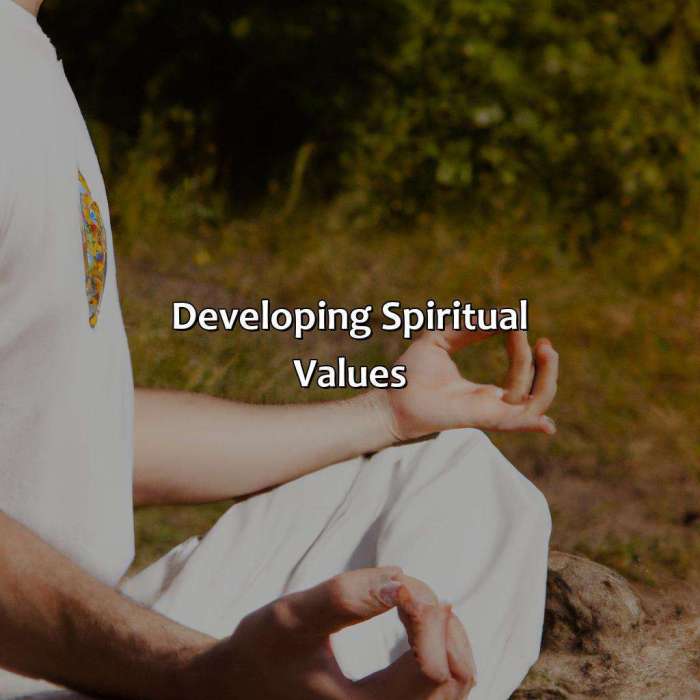How to Achieve Spiritual Enlightenment: A Journey of Self-Discovery

How to achieve spiritual enlightenment is a question that has captivated humanity for centuries. This quest for inner peace, wisdom, and a deeper understanding of existence has inspired countless spiritual traditions and practices across the globe. From the serene stillness of meditation to the dynamic flow of yoga, the path to enlightenment is a personal journey of self-discovery and transformation.
This exploration delves into the core principles, practices, and challenges of this transformative process, offering insights into the profound impact it can have on individuals and society as a whole.
This guide will navigate the diverse perspectives on enlightenment, exploring the common threads that unite these traditions. It will delve into the stages of spiritual growth, highlighting the importance of self-awareness, compassion, and acceptance. We will also examine the obstacles that often arise on this path, such as ego, attachment, and suffering, and offer practical strategies for overcoming them.
Ultimately, this journey is about embracing the transformative power of enlightenment and its potential to cultivate a life filled with meaning, purpose, and lasting happiness.
Understanding Spiritual Enlightenment

Spiritual enlightenment is a profound transformation of consciousness, marked by a deep understanding of the true nature of reality and a realization of one’s interconnectedness with all things. It is a state of liberation from suffering, ignorance, and illusion, characterized by inner peace, joy, and unconditional love.
The Significance of Spiritual Enlightenment
Spiritual enlightenment holds immense significance for individuals and society as a whole. It offers a path to liberation from suffering, fostering a sense of purpose, meaning, and fulfillment in life. Enlightenment inspires compassion, wisdom, and a deep understanding of the interconnectedness of all beings.
Perspectives on Enlightenment Across Spiritual Traditions
Spiritual enlightenment is a concept that has been explored and defined in various ways across different spiritual traditions. Each tradition offers its unique perspective on the nature of enlightenment and the path to achieving it.
- Buddhism: In Buddhism, enlightenment is known as Nirvana, a state of complete liberation from suffering and the cycle of rebirth. It is achieved through the Eightfold Path, a set of ethical guidelines and practices that cultivate mindfulness, wisdom, and compassion.
- Hinduism: Hinduism views enlightenment as Moksha, a state of liberation from the cycle of birth and death, achieved through the realization of one’s true self, or Atman, and its unity with the divine, or Brahman.
- Taoism: In Taoism, enlightenment is referred to as Wu Wei, a state of effortless action and complete alignment with the natural order of the universe. It is achieved through cultivating Tao, the universal principle that governs all things.
- Christianity: In Christianity, enlightenment is often associated with salvation, a state of spiritual rebirth and reconciliation with God. It is achieved through faith in Jesus Christ and the acceptance of his sacrifice.
- Sufism: Sufism, a mystical tradition within Islam, emphasizes the pursuit of fana, a state of complete surrender to God and the dissolution of the ego. It is achieved through practices such as meditation, prayer, and the study of Islamic scriptures.
Core Principles and Characteristics of an Enlightened State
While the path to enlightenment may differ across traditions, the core principles and characteristics of an enlightened state are often shared. These include:
- Transcendence of Ego: An enlightened individual experiences a shift in their sense of self, moving beyond the limitations of the ego and recognizing their true nature as interconnected with all things.
- Unconditional Love and Compassion: Enlightenment fosters a deep sense of love and compassion that extends to all beings, regardless of their differences or actions.
- Inner Peace and Joy: An enlightened state is characterized by a profound sense of inner peace, joy, and contentment, free from the fluctuations of the mind.
- Wisdom and Understanding: Enlightenment brings a deep understanding of the true nature of reality, including the interconnectedness of all things, the impermanence of all phenomena, and the illusory nature of suffering.
- Freedom from Suffering: Enlightenment liberates individuals from the cycle of suffering, as they understand the root causes of suffering and develop the capacity to overcome them.
- Clarity and Presence: An enlightened individual experiences a heightened state of awareness, characterized by clarity, presence, and a deep connection with the present moment.
The Path to Enlightenment

The journey to enlightenment is a deeply personal one, often involving a commitment to self-discovery and spiritual growth. It is not a destination to be reached, but rather a continuous process of unfolding and becoming. Many paths lead to enlightenment, each offering unique practices and perspectives.
Exploring these paths and their benefits can provide valuable insights into the nature of enlightenment and guide individuals toward their unique journey.
Meditation
Meditation is a core practice in many spiritual traditions, serving as a means to cultivate inner peace, clarity, and awareness. Through focused attention on the breath, sensations, or a specific object, meditators train their minds to become more present and less reactive to external stimuli.
Regular meditation can lead to reduced stress, improved emotional regulation, and a deeper understanding of the self.
Yoga
Yoga, a practice originating in ancient India, combines physical postures (asanas), breathing exercises (pranayama), and meditation to promote physical, mental, and spiritual well-being. The physical postures help to release tension and improve flexibility, while the breathing exercises regulate the flow of energy within the body.
Yoga can also enhance focus, reduce anxiety, and deepen one’s connection to the present moment.
Mindfulness
Mindfulness is a practice that involves paying attention to the present moment without judgment. It encourages individuals to observe their thoughts, feelings, and sensations with a non-reactive awareness. Mindfulness can be cultivated through various techniques, including meditation, yoga, and everyday activities.
It can lead to increased self-awareness, reduced stress, and a greater appreciation for life’s simple pleasures.
Contemplation
Contemplation involves deep reflection and inquiry into the nature of reality, existence, and the self. It often involves engaging with philosophical, spiritual, or religious texts, as well as engaging in introspection and dialogue with oneself. Contemplation can lead to profound insights, a deeper understanding of oneself and the world, and a sense of interconnectedness with all beings.
Comparison of Paths
| Path | Unique Features | Benefits |
|---|---|---|
| Meditation | Focus on breath, sensations, or objects; cultivate inner peace and awareness. | Reduced stress, improved emotional regulation, deeper self-understanding |
| Yoga | Combines physical postures, breathing exercises, and meditation; promotes physical, mental, and spiritual well-being | Increased flexibility, reduced anxiety, enhanced focus, and a deeper connection to the present |
| Mindfulness | Paying attention to the present moment without judgment; cultivates non-reactive awareness. | Increased self-awareness, reduced stress, greater appreciation for life’s simple pleasures |
| Contemplation | Deep reflection and inquiry into the nature of reality; engage with philosophical and spiritual texts | Profound insights, deeper understanding of oneself and the world, sense of interconnectedness |
Examples of Enlightenment
“The Buddha attained enlightenment through years of intense meditation and mindfulness.”
“The yogi Patanjali emphasized the importance of ethical conduct, mental discipline, and deep contemplation in his Yoga Sutras.”
“The Zen master Dogen taught the importance of mindful living and the interconnectedness of all things.”
Inner Transformation and Growth

The path to enlightenment is not a linear journey but rather a winding path of growth and transformation. It is a process of shedding old patterns and beliefs, embracing self-awareness, and cultivating compassion and acceptance. This journey involves navigating through various stages, each presenting its unique challenges and opportunities for personal growth.
The Stages of Spiritual Growth
Understanding the stages of spiritual growth can provide a framework for navigating the path to enlightenment. These stages are not necessarily sequential or fixed, and individuals may experience them in different orders or revisit them throughout their journey.
- Awakening: This initial stage is marked by a growing awareness of the limitations of the ego and the desire for something more meaningful. It often involves questioning existing beliefs and seeking a deeper understanding of life’s purpose.
- Purification: This stage involves confronting and releasing limiting beliefs, negative emotions, and unhealthy patterns. It may involve practices such as meditation, mindfulness, or therapy to cultivate self-awareness and emotional regulation.
- Illumination: As the journey progresses, individuals begin to experience glimpses of enlightenment, characterized by moments of profound insight and connection. These experiences may lead to a deeper understanding of the interconnectedness of all things and a sense of unity with the universe.
- Integration: The final stage involves integrating the insights gained from the journey into daily life. This involves applying wisdom and compassion in all interactions and living authentically in alignment with one’s true nature.
Challenges on the Path to Enlightenment
The path to enlightenment is not without its challenges. These challenges serve as opportunities for growth and transformation, helping individuals to develop resilience, patience, and self-compassion.
- Ego Resistance: The ego, driven by fear and attachment, may resist the process of transformation. This resistance can manifest as resistance to change, clinging to familiar patterns, and fear of the unknown.
- Doubt and Discouragement: As individuals progress on the path, they may encounter periods of doubt and discouragement. These challenges can be overcome by cultivating faith in the process, remembering the progress made, and seeking support from others on a similar journey.
- Attachment and Desire: Attachment to material possessions, relationships, and outcomes can hinder spiritual growth. By cultivating detachment and acceptance, individuals can free themselves from the suffering caused by desire and clinging.
The Importance of Self-Awareness, Compassion, and Acceptance
Self-awareness, compassion, and acceptance are essential for personal transformation and growth. They provide the foundation for navigating the challenges of the path and fostering a deeper connection with oneself and the world.
- Self-Awareness: The ability to observe one’s thoughts, feelings, and behaviors without judgment is crucial for personal growth. It allows individuals to identify limiting beliefs and patterns and make conscious choices that align with their values.
- Compassion: Compassion for oneself and others is essential for navigating the challenges of the path. It allows individuals to approach difficulties with kindness and understanding, fostering forgiveness and healing.
- Acceptance: Accepting oneself and the world as they are, without judgment or resistance, is a key aspect of spiritual growth. It allows individuals to release the suffering caused by striving for perfection and embrace the beauty of imperfection.
The Role of Introspection, Reflection, and Journaling
Introspection, reflection, and journaling are powerful tools for fostering inner growth and self-discovery. They provide a space for individuals to explore their thoughts, feelings, and experiences, leading to greater self-understanding and awareness.
- Introspection: Regularly taking time to turn inward and observe one’s thoughts, feelings, and motivations can lead to valuable insights and self-awareness. It allows individuals to identify patterns, beliefs, and motivations that may be hindering their growth.
- Reflection: Reflecting on past experiences, both positive and negative, can provide valuable lessons and insights. By examining the lessons learned from past challenges, individuals can cultivate wisdom and resilience.
- Journaling: Writing down thoughts, feelings, and experiences can help individuals process emotions, gain clarity, and track their progress on the path. Journaling can serve as a valuable tool for self-reflection and self-discovery.
Overcoming Obstacles and Illusions: How To Achieve Spiritual Enlightenment
The journey towards spiritual enlightenment is not always smooth sailing. We encounter numerous obstacles and illusions that can hinder our progress. These can range from external distractions to internal struggles, all stemming from the mind’s inherent tendencies. Understanding these obstacles and developing strategies to overcome them is crucial for navigating the path to enlightenment.
The Nature of Ego, Attachment, and Suffering
The ego, attachment, and suffering are interconnected concepts that play a significant role in hindering spiritual progress. The ego is the sense of self that is constructed through our experiences and perceptions. It craves validation, seeks to protect itself, and often leads to feelings of separation and isolation.
Attachment, on the other hand, is clinging to people, objects, and experiences, believing they bring us happiness or security. This clinging creates a sense of dependence and can lead to suffering when things don’t go as planned. Suffering arises from our attachment to desires and our aversion to unpleasant experiences.
It’s a cycle of wanting and not wanting, leading to dissatisfaction and discontent.
- Overcoming Ego: The ego can be overcome through practices like mindfulness, self-reflection, and compassion. Mindfulness helps us observe our thoughts and feelings without judgment, allowing us to detach from the ego’s narrative. Self-reflection allows us to identify our ego-driven patterns and challenge them.Compassion for ourselves and others helps us move beyond the ego’s self-centeredness and embrace a more interconnected perspective.
- Overcoming Attachment: Attachment can be overcome by cultivating detachment, acceptance, and non-attachment. Detachment involves recognizing that nothing is permanent and that clinging to things will only lead to suffering. Acceptance involves embracing the present moment with its joys and sorrows without resistance.Non-attachment means letting go of the need to control outcomes and accepting things as they are.
- Overcoming Suffering: Suffering can be overcome by cultivating acceptance, forgiveness, and gratitude. Acceptance involves acknowledging and embracing the pain and discomfort without resisting it. Forgiveness allows us to release the resentment and anger that fuel suffering. Gratitude shifts our focus from what we lack to what we have, fostering a sense of contentment and appreciation.
Managing Negative Emotions and Developing Resilience
Negative emotions are a natural part of life, but they can become obstacles to spiritual growth if we allow them to control us. Managing negative emotions requires developing self-awareness, emotional regulation skills, and resilience.
- Self-Awareness: Cultivating self-awareness involves paying attention to our thoughts, feelings, and bodily sensations without judgment. This allows us to identify triggers for negative emotions and understand their underlying causes.
- Emotional Regulation: Emotional regulation involves learning to manage our emotions effectively. This includes techniques like deep breathing, mindfulness meditation, and cognitive reframing. Deep breathing helps to calm the nervous system, while mindfulness meditation allows us to observe our emotions without getting carried away by them.Cognitive reframing involves challenging negative thoughts and replacing them with more positive and realistic ones.
- Resilience: Resilience is the ability to bounce back from adversity and challenges. It involves developing a sense of optimism, self-compassion, and a belief in our ability to cope with difficult situations.
The Impact of Enlightenment

Spiritual enlightenment is not merely a philosophical concept; it is a transformative experience that profoundly impacts individuals and society. It is a journey of self-discovery, a process of shedding limiting beliefs and conditioning, and ultimately, a state of being characterized by wisdom, peace, and compassion.
Transformative Effects on Individuals
The effects of enlightenment on individuals are multifaceted and profound. Enlightened individuals often experience a significant shift in their perception of reality, leading to a deeper understanding of themselves, others, and the interconnectedness of all things. This newfound wisdom fosters a sense of inner peace, joy, and equanimity, allowing them to navigate life’s challenges with grace and resilience.
- Increased Happiness and Fulfillment: Enlightenment is often associated with a profound sense of happiness and fulfillment. By transcending the limitations of ego and conditioning, individuals experience a deep sense of inner peace and contentment, leading to a more joyful and fulfilling life.This shift in perspective allows them to appreciate the simple things in life and find joy in every moment.
- Enhanced Compassion and Empathy: Enlightened beings are characterized by their profound compassion and empathy for all beings. They recognize the inherent interconnectedness of all life and act with kindness, understanding, and forgiveness. This heightened sense of compassion extends beyond personal relationships, motivating them to contribute to the well-being of others and the world at large.
- Improved Relationships: The inner peace and wisdom gained through enlightenment often lead to more harmonious and fulfilling relationships. Individuals become more self-aware, less reactive, and more understanding of others’ perspectives. This fosters open communication, empathy, and forgiveness, creating a foundation for healthier and more meaningful connections.
- Increased Creativity and Productivity: Enlightenment can spark a surge of creativity and productivity. By transcending limiting beliefs and mental barriers, individuals unlock their true potential, leading to new insights, innovative ideas, and a greater capacity for action. This creative energy can manifest in various forms, from artistic expression to scientific breakthroughs.
Resources and Guidance

The journey towards spiritual enlightenment is often enhanced by the guidance and insights of others who have walked a similar path. This section explores various resources and support systems available to aid your exploration.
Recommended Resources, How to achieve spiritual enlightenment
Exploring a wide range of perspectives and practices can deepen your understanding of spiritual enlightenment. Here are some recommended resources:
- Books:
- The Power of Now by Eckhart Tolle: This book emphasizes the importance of living in the present moment and transcending the limitations of the ego.
- The Bhagavad Gita: An ancient Indian scripture that offers profound insights into the nature of reality, duty, and the path to liberation.
- The Tibetan Book of Living and Dying by Sogyal Rinpoche: This book explores the Tibetan Buddhist perspective on death, dying, and the afterlife, offering guidance for a peaceful transition.
- Articles:
- Websites like “Mindfulness.org” and “Lion’s Roar” provide articles and resources on mindfulness, meditation, and various spiritual traditions.
- Journals like “The Journal of Transpersonal Psychology” and “The Journal of Consciousness Studies” publish research and insights on spiritual experiences and altered states of consciousness.
- Online Resources:
- Online platforms like “Insight Timer” and “Headspace” offer guided meditations and mindfulness practices.
- Websites like “The Chopra Center” and “Spirituality & Practice” provide information on various spiritual traditions and practices.
Spiritual Teachers and Mentors
Seeking guidance from experienced spiritual teachers and mentors can provide valuable insights and support. These individuals often have a deep understanding of spiritual principles and practices and can offer personalized guidance based on your unique needs.
- Traditional Teachers:
- In many spiritual traditions, there are lineage holders who have dedicated their lives to teaching and preserving ancient wisdom. These teachers can provide authentic teachings and guidance within a specific tradition.
- Modern Teachers:
- Contemporary teachers often integrate insights from various spiritual traditions and offer accessible teachings for modern audiences. They may provide workshops, retreats, and online courses to support spiritual growth.
- Mentors:
- Mentors can be individuals who have achieved a level of spiritual understanding and can offer personalized support and guidance. They may be teachers, friends, or family members who inspire and encourage your journey.
Spiritual Communities
Connecting with like-minded individuals in spiritual communities can provide a sense of belonging, support, and shared purpose. These communities often offer opportunities for practice, learning, and mutual encouragement.
- Meditation Centers:
- Meditation centers offer a space for regular practice, workshops, and retreats, providing a supportive environment for deepening your meditation practice.
- Yoga Studios:
- Yoga studios often offer classes that integrate physical postures with mindfulness and breathwork, promoting both physical and mental well-being.
- Spiritual Groups:
- Groups dedicated to specific spiritual traditions or practices can provide a space for sharing experiences, learning from each other, and supporting each other’s journeys.
Key Principles and Practices of Spiritual Traditions
| Tradition | Origin | Key Beliefs | Practices |
|---|---|---|---|
| Buddhism | Ancient India, 6th century BCE | The Four Noble Truths, the Eightfold Path, the concept of suffering and its cessation | Meditation, mindfulness, compassion, ethical conduct |
| Hinduism | Ancient India, 3rd millennium BCE | The concepts of Brahman (ultimate reality), karma, reincarnation, dharma (duty), moksha (liberation) | Yoga, meditation, chanting, rituals, devotion to deities |
| Christianity | 1st century CE | Belief in God as a Trinity (Father, Son, Holy Spirit), Jesus Christ as the Son of God, salvation through faith | Prayer, Bible study, worship, service to others |
| Islam | 7th century CE | Belief in one God (Allah), Muhammad as the final prophet, the Quran as the word of God | Prayer, fasting, charity, pilgrimage to Mecca |
| Taoism | Ancient China, 6th century BCE | The concept of Tao (the Way), yin and yang, balance and harmony | Meditation, tai chi, qigong, living by the Tao |
Closure

Embarking on the path to spiritual enlightenment is a deeply personal and rewarding journey. It is a quest for inner peace, wisdom, and a deeper understanding of ourselves and the world around us. While the path may be challenging at times, the transformative effects of enlightenment are profound, leading to increased happiness, fulfillment, and a sense of purpose.
By exploring the principles and practices articulated in this guide, you can begin your journey of self-discovery and embark on a path that leads to a more fulfilling and meaningful life.
Comments are closed.